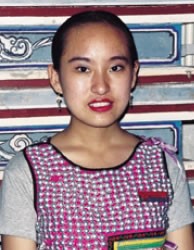The Enu, who are officially part of the Hani nationality, are also known as the Ximeluo in China. The "Si-mou-lou" were first mentioned in a 1903 survey of Yunnan's ethnic composition. Missionary John Kuhn, in his 1945 tribal survey of Yunnan, listed the "Simoulu" as living at "Ning Erh and Qingku." Qingku is the old spelling for today's Jinggu County, in Simao Prefecture.
By the 1960s the Enu living near Chinese towns and cities had already begun the gradual process of assimilation. Today, only those living in more remote locations retain their ethnicity and language. The demise of the Enu as a distinct people group may have been a contributing factor in the Chinese government's decision not to grant them status as a separate minority.
Most Enu live in simple homes constructed of wood and thatched roofs. Most customs and ceremonies of the Enu now closely mirror that of the dominant Han Chinese. Earlier in the twentieth century, however, they still retained many unique customs that reflected their animistic beliefs. In one sacrifice, they spread the hide of a bull over a wooden frame, under which family leaders from feuding sides would drink the bull's blood and take a peace oath. If either party broke this oath, its members would meet the same fate as the slaughtered animal.
Most Enu people are animists, especially the elderly, who continue to offer prayers and burn incense before spirit and ancestral altars. The younger generation reluctantly continue the practices of their parents out of respect for their forefathers.
However, there is a small Enu church.
There are a small number of scattered Enu Christians, including some who attend a church consisting of people from nine different minority groups in Mengla County near the Laos border. Overall, however, southern Yunnan has been woefully neglected by the scouts of Christianity.
Pray for the Enu Christians to become fully dedicated to the Lord, and willing to lead holy lives.
Pray for the Enu church to be a blessing to the other peoples around them.
Pray for the Enu to become a powerful missionary force around them.
Scripture Prayers for the Enu in China.
Operation China, Asia Harvest, Copyrighted © Used with permission
| Profile Source: Joshua Project |










